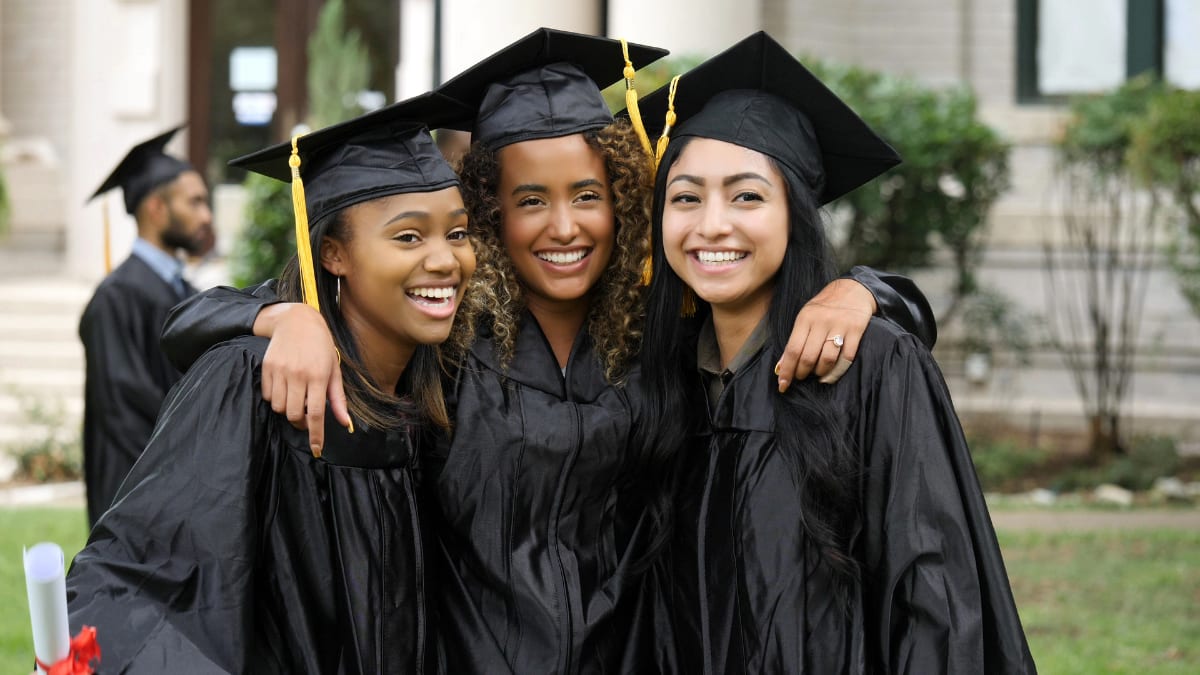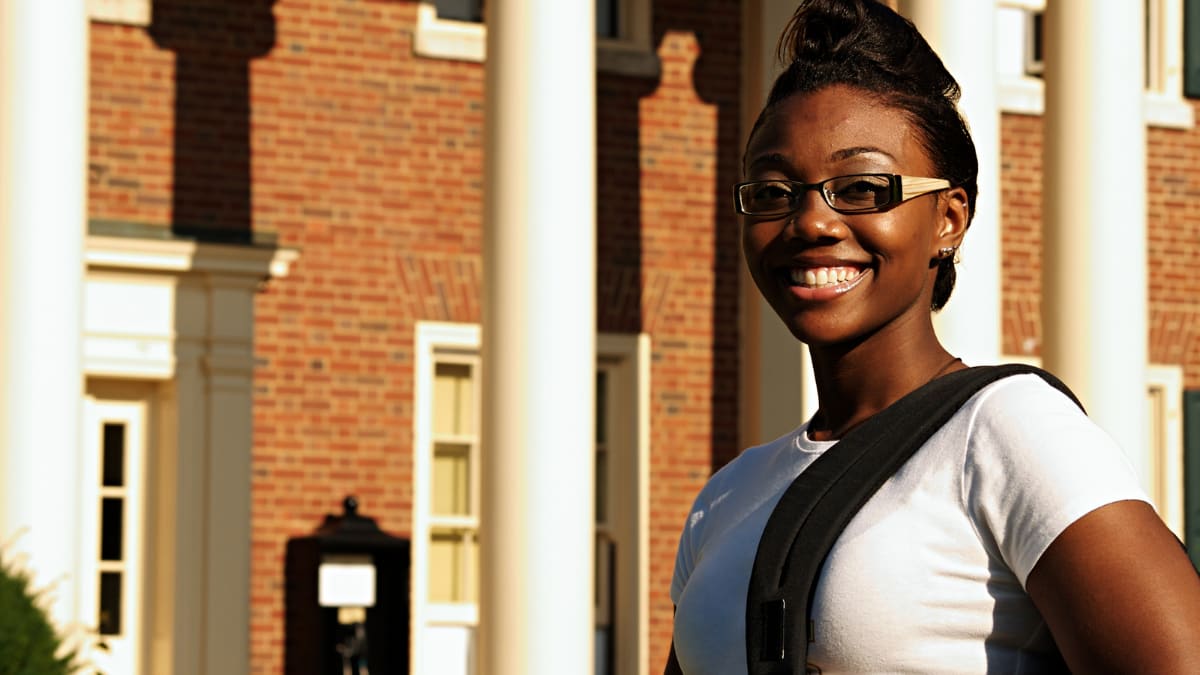Colleges with the Most Influential Black Graduates

In honor of black history month, we set out to answer the question, “where did America’s most influential black graduates go to college?”
As you might expect, there were many IV League universities on the list. But we were surprised by more than a few of the colleges with most influential black graduates.
And this made us wonder if these colleges might deserve a little more recognition than they are typically afforded.
The schools in this ranking have produced some of the most famous and beloved figures of today’s world, and their impact on black culture and society at large cannot be understated.
Key Takeaways
- Colleges and universities have cultivated some of the most influential figures in history.
- We aim to recognize the colleges with the most influential black graduates.
- Among these graduates are the most respected and influential people of the last 100 years.
Historically Black Colleges and Universities
While not all of the colleges that produce influential back graduates are historically black colleges and universities, their importance shouldn’t be overshadowed.
Historically black colleges and universities aim to engage black students and preserve the unique identities of black culture. As a result, they produce thriving communities of successful black alumni.
While we might not have covered all of these schools below, they deserve mentions nevertheless.
Jump directly to our rankings of the best historically black colleges and universities (HBCUs)–a list which includes noteworthy institutions like Lincoln university, Tuskegee University Howard University, Morehouse College, Spelman College, and more.
You can also explore the best HBCUs by program type or degree level:
Best HBCUs with Masters Programs

Back to Top
Colleges With the Most Influential Black Graduates
The list of schools included here is a mix of some of the most prestigious research universities in the nation and many of the top historically black colleges and universities (HBCUs).
Columbia University
Career Outlook for degree at Columbia University
What is Columbia University known for?
Columbia University’s faculty and alumni have been influential in:
Most Influential Alumni
Columbia University is a highly prestigious institution both generally and within the scope of Black History. Prominent students include Class of 1923 Columbia Law graduate and world-renowned singer Paul Robeson, 44th President of the United States Barrack Obama (Class of ’83), and Shirley Chisholm (Class of 1951), the first African American woman elected to Congress. In addition to the accomplishments of its illustrious graduates, Columbia University is recognized as the birthplace for the school of thought known as Black Theology.
College of the Holy Cross
Career Outlook for degree at College of the Holy Cross
What is College of the Holy Cross known for?
College of the Holy Cross’s faculty and alumni have been influential in:
- Religious Studies
- Sociology
- Literature
- History
- Psychology
- Communications
- Education
- Mathematics
- Philosophy
- Political Science
Most Influential Alumni
College of the Holy Cross is a small Jesuit liberal arts college located in Worcester, Massachusetts. It’s unlikely inclusion here is because of its unique role in launching the careers of numerous notable Black figures during the height of the Civil Rights era. Holy Cross had always been desegregated, but Black students were not well represented. In 1968, spurred by the assassination of Dr. Martin Luther King, Holy Cross accelerated its efforts to recruit Black students. The result was a close-knit community of ambitious students, active engagement in the push for Civil Rights, and a surge of prominent graduates such as Pulitzer Prize-winning novelist Edward P. Jones, former deputy mayor of New York Stanley E. Grayson, and Supreme Court Justice Clarence Thomas.

Harvard University
Career Outlook for degree at Harvard University
What is Harvard University known for?
Harvard University’s faculty and alumni have been influential in:
Most Influential Alumni
Harvard University boasts a list of alumni with few equals in their prestige. This is certainly the case with Black history. Indeed, among its most prominent scholars was an author and historian named Carter G. Woodson. Woodson is often credited as the “father of black history,” a title cemented by his hand in launching “Negro History Week” in 1926. This celebration would ultimately evolve into Black History Month. Woodson earned his PhD in history at Harvard, becoming only the second Black man to do so. The first was W. E. B. Du Bois, a deeply influential scholar, activist, and co-founder, 1909, of the National Association for the Advancement of Colored People (NAACP).
Brandeis University
Career Outlook for degree at Brandeis University
What is Brandeis University known for?
Brandeis University’s faculty and alumni have been influential in:
- Sociology
- Philosophy
- Mathematics
- Psychology
- Economics
- Political Science
- Physics
- History
- Literature
- Computer Science
Most Influential Alumni
Brandeis University was founded in 1948 with a mission of openness and inclusion. The university’s academic community was vocal in its support for equality. 1949, the university very first convocation speech was delivered by African-American scholar and future Nobel Peace Prize recipient, Dr. Ralph Bunche. The university supported the founding of the school’s own NAACP chapter in 1952. The following year, the chapter hosted African-American poet and social activist Langston Hughes. In the following years, visits from author James Baldwin and Martin Luther King would galvanize the student body. Many Brandeis students traveled from the Waltham, Massachusetts campus to the South to participate in Civil Rights protests and sit-ins. While the majority at Brandeis were white students, the environment would inspire some of the period’s most powerful Black activists, including Margo Jefferson and Angela Davis.

Oklahoma Christian University
Career Outlook for degree at Oklahoma Christian University
What is Oklahoma Christian University known for?
Oklahoma Christian University’s faculty and alumni have been influential in:
- Nursing
- Psychology
- Literature
- Sociology
- Communications
- Religious Studies
- Education
- Computer Science
- History
- Business
Most Influential Alumni
Founded in 1950 as Oklahoma Christian College, the university is noted today as the undergraduate alma mater of Molefi Kete Asante, a leading figure in the fields of African-American studies, African studies, and communication studies. Today, Asante is both a Temple University Professor of Africology and the founder of the university’s PhD program in African-American Studies. In 2021, Oklahoma Christian College celebrated Black History Month by invited voting rights icon JoAnne Bland to speak on campus.
Wilberforce University
Career Outlook for degree at Wilberforce University
What is Wilberforce University known for?
Wilberforce University’s faculty and alumni have been influential in:
- Sociology
- Political Science
- Social Work
- Communications
- Psychology
- Literature
- Medical
- Engineering
- Computer Science
- Biology
Most Influential Alumni
Wilberforce University is a critically important institution in Black history. In addition to being an early forerunner in the establishment of Historically Black Colleges and Universities, Wilberforce was the first institution of higher education owned and operated by African Americans. Founded in 1856 with the mission of providing classical education and teacher training for Black youths, the Ohio-based school drew many of its first students from the south. Though Wilberforce struggled for survival during the Civil War, the 1890′s brought both a professorial tenure from top Pan-African scholar W. E. B. Du Bois and a resurgence of enrollees. Among the scholars who would pass through Wilberforce in the following century were NASA mathematician Dorothy Vaughan and highly decorated sociologist and Harvard professor William Julius Wilson.
William Julius Wilson

California State University, Los Angeles
Career Outlook for degree at California State University, Los Angeles
What is California State University, Los Angeles known for?
California State University, Los Angeles’s faculty and alumni have been influential in:
- Economics
- Philosophy
- Sociology
- Psychology
- Criminal Justice
- Political Science
- Literature
- Mathematics
- Business
- History
Most Influential Alumni
California State University comprises 23 campuses throughout the state of California. Each campus is a reflection of its surrounding community. This includes CSU’s Los Angeles campus, a university deeply tied to a city with both deep history of racial tension and the promise of great opportunity for advancement. The list of notable graduates and academics from the Los Angeles campus is a reflection of this promise. Prominent alumni include President of the African American Film Critics Association Gil Robertson IV, Mervyn Dymally, who was the first black Lt. Governor of California, and Distinguished Professor of Economics at George Mason University, Walter E. Williams.
Eastern University
Career Outlook for degree at Eastern University
What is Eastern University known for?
Eastern University ’s faculty and alumni have been influential in:
- Sociology
- Anthropology
- Religious Studies
- Political Science
- Social Work
- Criminal Justice
- History
- Philosophy
- Literature
- Medical
Most Influential Alumni

Fisk University
Career Outlook for degree at Fisk University
What is Fisk University known for?
Fisk University’s faculty and alumni have been influential in:
Most Influential Alumni
Fisk University, in addition to being a groundbreaking Historically Black College, is in fact the oldest institution of higher learning in Nashville, Tennessee. Founded in 1866, it was also the first Black College, in 1930, to gain accreditation from the Southern Association of Colleges and Schools (SACS). Its importance is underscored by its most famous undergraduate, scholar and future NAACP co-founder W.E.B. Dubois, who graduated in 1888. Fisk would also be at the front lines of the Civil Rights Movement in the 1950s and 1960s. Civil Rights icon and future U.S. Congressman John Lewis was a member of the university’s student coalition. And Fisk would also help launch the career of influential author and historian John Hope Franklin.
West Virginia State University
Career Outlook for degree at West Virginia State University
What is West Virginia State University known for?
West Virginia State University’s faculty and alumni have been influential in:
Most Influential Alumni
West Virginia State University was founded in 1891, making the Historically Black College one of the original 19 land-grant institutions established by the Morrill Act. In 1939, West Virginia became one of six HBCUs to recieve authorization from the Civil Aeronautics Authority to establish an aviation program. As a result, West Virginia helped to prepare many African American pilots for service in World War II, including several who went on to join the famed Tuskegee Airmen. Among some of West Virginia’s most influential alumni are ground-breaking nurse, educator, and champion of African American nurses Mary Elizabeth Carnegie, Civil Rights leader Leon Sullivan, and NASA mathematician Katherine Johnson.

Yale University
Career Outlook for degree at Yale University
What is Yale University known for?
Yale University’s faculty and alumni have been influential in:
Most Influential Alumni
Spelman College
Career Outlook for degree at Spelman College
What is Spelman College known for?
Spelman College’s faculty and alumni have been influential in:
- Sociology
- Education
- Literature
- History
- Political Science
- Mathematics
- Chemistry
- Economics
- Psychology
- Social Work
Most Influential Alumni
Spelman College began as an Atlanta-based female seminary in 1881, but received its charter in 1924. This would make the second oldest private Historically Black liberal arts college for women in the United States. It would also make it a future hotbed for both thought leadership and activism within both civil rights and women’s liberation movement. Among Spelman’s notable alumni are author and activist Alice Walker, voting rights leader and Georgia State Representative Stacey Abrams, and civil rights icon Marian Wright Edelman, who is said to have had a profound influence on Martin Luther King, Jr. during their time working together.
Western Michigan University
Career Outlook for degree at Western Michigan University
What is Western Michigan University known for?
Western Michigan University’s faculty and alumni have been influential in:
Most Influential Alumni
Western Michigan University was home to a number of extremely prominent Black scholars. Among them were professor Vernie Merze Tate is responsible for a remarkable number of “firsts” including becoming the first African American woman to graduate from Western Michigan’s teaching college, the first to attend University of Oxford, and the first to earn PhD in government from Harvard. Another of Western Michigan’s most noteworthy graduates was Dennis Archer, an attorney and legal scholar who would become the first African American to preside as president over the American Bar Association (ABA).

Carson–Newman University
Career Outlook for degree at Carson–Newman University
What is Carson–Newman University known for?
Carson–Newman University’s faculty and alumni have been influential in:
Most Influential Alumni
Founded in 1851, this Jefferson City, Tennessee institution is home to roughly 2500 students. However, this small private Baptist university would be responsible for graduating a highly influential author, minister, and Vanderbilt University Professor of Divinity Michael Eric Dyson. Dyson is noted for his prolific writing on Black icons, with more than 20 texts on subjects such as Martin Luther King, Malcolm X, and Marvin Gaye.
University of Tennessee at Martin
Career Outlook for degree at University of Tennessee at Martin
What is University of Tennessee at Martin known for?
University of Tennessee at Martin’s faculty and alumni have been influential in:
- Earth Sciences
- Mathematics
- Philosophy
- Criminal Justice
- Political Science
- Biology
- History
- Nursing
- Education
- Social Work
Most Influential Alumni
In 1961, the Martin, Tennessee campus became the first in the University of Tennessee system to begin racial desegregation. This would help to open the door to a number of highly influential Black civic leaders. policy makers and activists. Noteworthy among them is Van Jones, who served as President Barack Obama’s Special Advisor for Green Jobs before becoming a New York Time’s bestseller, television personality and general policy advocate.
Massachusetts Institute of Technology
Career Outlook for degree at Massachusetts Institute of Technology
What is Massachusetts Institute of Technology known for?
Massachusetts Institute of Technology’s faculty and alumni have been influential in:
- Computer Science
- Engineering
- Economics
- Chemistry
- Physics
- Mathematics
- Earth Sciences
- Business
- Biology
- Communications
Most Influential Alumni
MIT is highly noted for its contributions in the sciences and technology fields. But the prestigious institution is also noted for facilitating a number of “firsts” among African American scholars. This includes Marron William Fort, the first African American to earn a PhD in engineering, Robert Robinson Taylor, who was both the first African American enrolled at MIT and the very first Black accredited Architect in America, and Shirley Ann Jackson, the first woman to earn a physics doctorate at MIT as well as the 18th President of the Rensselaer Polytechnic Institute.
Duquesne University
Career Outlook for degree at Duquesne University
What is Duquesne University known for?
Duquesne University’s faculty and alumni have been influential in:
- Religious Studies
- Criminal Justice
- Philosophy
- Social Work
- Sociology
- Communications
- Psychology
- Business
- Law
- Nursing
Most Influential Alumni
Duquesne University largely appears on our list for the towering influence of a single figure. Attorny, activist and professor was born and raised in the Pittsburgh region. He would go on to earn his bachelor’s degree at Pittsburgh’s Duquesne University. Today, Derrick Bell is widely regarded as the scholar who introduced Critical Race Theory to academic circles. Critical Race Theory has become a highly consequential school of those as scholars and students work to better understand the intersections of race, economic justice, legal justice, gender, and more.
See all kinds of tips, tricks and hacks for surviving your college experience with a look at our Blog.
See our Resources Guide for much more on studying, starting your job search, and more.


















